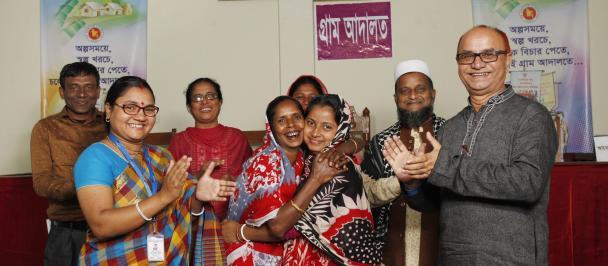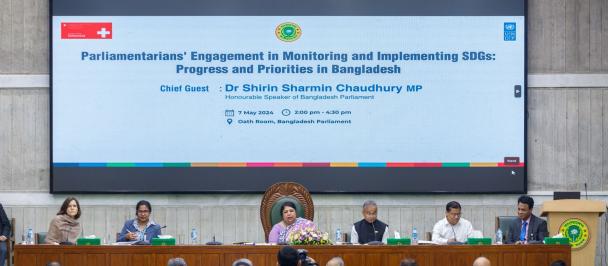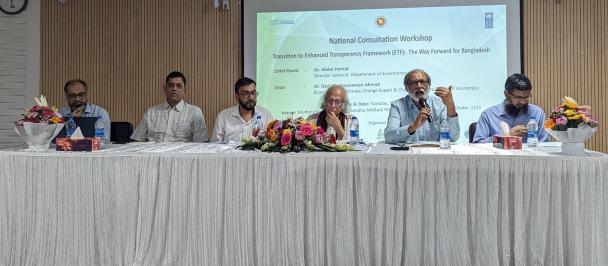Ribana was selected by UNDP for the Youth Co:Lab program last year and they are benefitting around 500 farmers and rural women as the company collects the organic ingredients from different corners of the country
This News Originally published in The Business Standard
Mohammad Wahiduzzaman Sadi had always wanted to be an entrepreneur and tried his luck in many businesses. But nothing really worked out well.
One day, one of Wahid's best friends gave him an expensive organic soap as a gift, which made him very curious. Sadi was not even aware that organic soaps could be designer products and so he reached out to the friend who gave him the soap to learn more about it. He then turned to the internet, and learned more about the process, benefits and importance of organic soaps. Finally, he wondered: "Why can't we make organic soaps like this in the country?"
Sadi studied pharmacy at the University of Development Alternative and worked at a pharmaceutical company prior to founding Ribana
As he already knew that harsh chemicals are used to make skincare products which harm the skin, Sadi worked out which organic ingredients to use to make the soaps to ensure they actually benefit people's skins. He settled on goat's milk as the primary ingredient. Goat's milk would have to be sourced locally. So, not only was he looking a potentially profitable business idea, but also one where he could help the local farmers and producers. After a year of thorough research and hard work, Ribana Bangladesh finally started its journey in 2015 with Sadi as CEO. "We had to find out what type of soaps were needed for our weather, different skin types, and the type of products which will resolve the skin problems of the people of our country," Sadi told The Business Standard. Sadi had a small amount of savings which he invested in the business at the beginning. |
 Mohammad Wahiduzzaman Sadi, CEO of Ribana Bangladesh. Photo: Courtesy |
"As Ribana is 'made in Bangladesh', most people were not interested in buying the products at the beginning," said Sadi, while talking about the challenges he faced initially.
In the beginning, Ribana products were sold online through its Facebook and Instagram pages. Now, their products are available at many super shops, beauty salons, and pharmacies.
There are three types of soaps - bath soaps, toilet soaps and carbolic soaps. Usually, bath soaps are used in the shower, toilet soaps in the toilets and carbolic soaps for giving baths to pet animals.
"In our country bath soaps are known as beauty soaps. The main difference between a general soap and organic soap is that organic soaps don't have any preservatives or added colour and chemicals.
"Handmade organic soaps are made from pure oil which is good for skin," informed Sadi.
When Sadi started making organic soaps, the idea wasn't as popular. But the scenario changed in a few years and the organic soap market has been growing rapidly in Bangladesh. Besides Ribana, SoaperStar and Mehars are among the few companies that make organic handmade soaps.
"In our country, the market for organic skincare products is worth over Tk200 crore," Sadi told the correspondent.
He added, "Worldwide, the market size of organic skincare is over USD12 billion. And India is exporting their products to the Middle East and Europe. If we can export our products, we will be able to collect huge revenue from it."
"Everybody wants to use chemical-free products in many countries such as Australia, Japan, and the USA," Sadi continued.
Currently, Ribana offers four different varieties of soaps - Activated Carbon Soap for cleansing and getting rid of acne, Goat's Milk Soap for moisturising sensitive skin, Saffron Goat's Milk Soap for nourishment, and Makeup Remover Soap for removing makeup
Saffron Goats Milk Soap. Photo: Courtesy
Ribana has recently added various organic oils to their product line-up.
All the soaps are fully handmade through the Cold Process Method and the best natural ingredients are used to make the soaps.
Starting from collecting goat's milk to castor oil to saffron, Sadi pays close attention to every single detail.
It takes a month to prepare the soaps and it has to go through three different processes.
Sadi personally undertakes the testing for the soap's pH levels, as well as seeing his products through - from mixing to curing to packaging. Ribana also has chemists to ensure the product's quality.
When Sadi was asked why goat's milk is used in Ribana soaps, he replied, "While doing my research to make an organic soap, I found that goat's milk is good for boosting moisture levels, repairing the skin's barrier, preventing fine lines and wrinkles, and reducing acne and kills skin bacteria in our region."
Through Ribana, around 500 farmers and rural women are being benefited as the company collects the organic ingredients from different corners of the country.
Through Ribana, around 500 farmers and rural women are being benefited as the company collects the organic ingredients from different corners of the country. Photo: Courtesy
Last year, Ribana was also selected by UNDP for the Youth Co:Lab program.
Co-created in 2017 by UNDP and the Citi Foundation, Youth Co:Lab aims to empower and invest in youth, so that they can accelerate the implementation of Sustainable Development Goals through leadership, social innovation and entrepreneurship.
"We learned so much through UNDP about the business. They are going to help sell our products on Amazon, ebay, and Alibaba," Sadi informed.
He added that Ribana will add a full range of skincare products to their list eventually.
Ribana is currently collaborating with many well-known brands and the products are available outside Dhaka as well.
In the near future, Ribana aims to be one of the brands which will take the Bangladeshi organic and handmade cosmetic products to the global market.
The prices of the soaps start from Tk350 and range till Tk950.

 Locations
Locations







